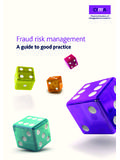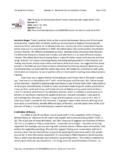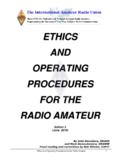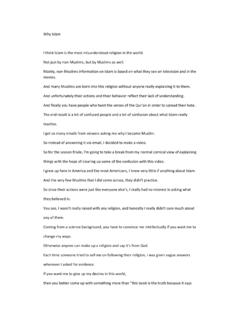Transcription of Using Brookfield’s Four Lenses on Teaching to Inform My ...
1 Using brookfield s four Lenses on Teaching to Inform My Practice as a Teacher In this essay, I will use brookfield s (1995) four Lenses for reflection to begin to develop a framework for thinking about how my students experience learning, as well as what impact the Teaching methods and strategies I choose might have on their experiences. I begin by looking through each of the Lenses (autobiography, our students eyes, our colleagues experiences and the theoretical literature), and conclude with a synthesis of what I have discovered from these reflections.
2 Autobiography As an undergraduate, I had an atypical university experience. I went to a small, private liberal arts institution (not much larger than ADFA) that emphasized quality Teaching as well as faculty and student-faculty research. During my degree, I experienced courses from across the university while I completed three majors in very different disciplines: art history, chemistry and geography. I think my generally very positive experience can be attributed to the fact that I had a well-developed ability to anticipate what was expected of me in most contexts, and that I was good at cramming for exams!
3 When I think back to how much of my undergraduate education has really stuck with me, it is a shockingly small amount. Out of interest, I dug out some of my old course syllabi and tried to use them to jog my memory about what I got out of the course. Most of what I remember relates to an activity I did and how I went about doing the activity rather than things I learned for an exam. The courses I enjoyed and in which I learned the most were generally not the ones that I found the easiest. Rather, they were often courses that I struggled with, but felt a sense of achievement from at the end.
4 brookfield (1991, p. 43-4) notes that this is a common experience for learners: when asked to describe significant learning experiences, adult learners often cite challenging experiences that they were able to survive resulted in increased confidence and a sense of satisfaction. I particularly remember a physical chemistry course in which I was ecstatic about receiving a 39 on an exam. The marks in this course were norm-referenced, and the median exam score was 27, so 39 was actually a pretty good result! It was also in my more difficult chemistry courses in which I developed a learning partnership with my lab partner.
5 To this day, this individual is the person from my university days with which I have the strongest relationship. I think that as an undergraduate, a great deal of my learning actually took place outside the classroom or laboratory (while working on assessments or through various degree-related jobs I had), and at ADFA in particular, where we do not have the opportunity to send students out into internships or other simulated work experiences, I find that it is a continual struggle to get students to engage outside the doors of Building 22. In the ADFA context, it may just require more creativity on my part, and perhaps a bit of talking with the engineers.
6 I recall a recent conversation with Ian Faulconbridge, a lecturer in electrical engineering who was himself once an ADFA cadet. Ian recounted a particularly challenging (and realistic) project that his lecturers set in which students had to figure out how to pass an electrical signal from the top of one peak in Canberra to another location and remarked upon how much he learned from and enjoyed that project (Faulconbridge 2004). I think that some of the most telling aspects of how I personally learn can actually be seen from my everyday life and how I experience research life at the university.
7 When I took up my job at ADFA, I knew that there were few other researchers on campus who worked in areas that were similar to my research. What I did not know was how important a culture of learning and research was to me. I really missed the variety of research seminar series on campus that I have had access to at other universities in which I have studied and worked. This was very depressing until I started to find some people I could connect with on an intellectual level. In other words, I discovered that I have a very low tolerance for not being challenged and stimulated.
8 Because I was lucky as a student in that I was often challenged and felt stimulated, it hadn t really occurred to me that my students might feel the same way. Anecdotally, I think that I have some evidence for my students having experienced a lack of challenge and stimulation. The first semester I taught our introductory class in geographic information science, I experienced a lot of resistance from the students in terms of participating in class and the practical exercises. I often heard the complaint that something I asked them to do was Boring. The second time I taught this class, I made it (what I considered to be) a more challenging class in which I tried to induce students to think more critically about what they were doing, why I had asked them to do the task, and what implications their actions had for the types of analysis they were trying to complete.
9 The students seemed to enjoy the course more (I certainly heard fewer complaints) as well as take more away from the experience (based on their performance on exams and in practical exercises). Although I had been involved in collaborative research projects as a postgraduate student, I have also found new challenges in working collaboratively since coming to Australia. One of the things that working in a team has taught me is more about how I approach the process of research, and by extension, learning. I have found that when moving into a (somewhat) new area, I need to be systematic in the way I approach learning about the problem.
10 Jumping around really frustrates me (I think it makes it harder to build up a picture of the state of knowledge), and I am definitely a person who prefers to read volumes of any sort, whether they are books, magazines or special issues of journals in a linear fashion, exhaustively from start to finish. This preference also applies to thinking about how to set up an experiment or analyze data. In contrast, however, when I am reading things that are not connected to a particular project or specific goal, I really enjoy reading widely, and it is often in this context that I find things from other literatures that connect or resonate with something that I am currently working on, and I find these serendipitous finds extremely exciting.






